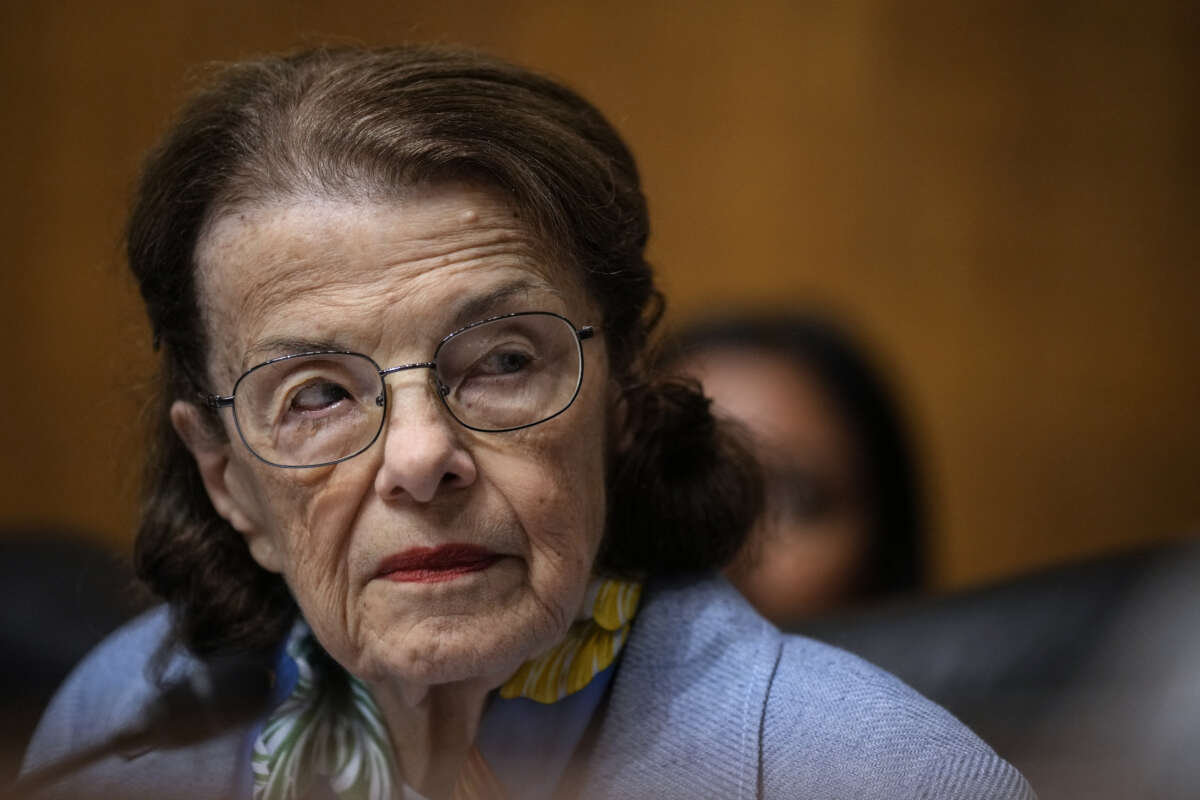Truthout is a vital news source and a living history of political struggle. If you think our work is valuable, support us with a donation of any size.
Senator Dianne Feinstein, who died on Thursday evening at the age of 90, leaves behind a long and complex legacy on climate and environmental issues. Feinstein represented California as a Democrat in the U.S. Senate for more than 30 years, becoming the longest-serving woman in Senate history, and during that time she brokered a number of significant deals to protect and restore the natural landscapes of the West. In recent years, as politics shifted, she found herself on the receiving end of criticism over her approach to tackling the climate crisis.
After taking office in 1992 following a decade as the mayor of San Francisco, Feinstein established herself as a champion for conservation. She worked to pass legislation that would protect millions of acres of California wilderness from development and extractive industry, using her deft skills as a negotiator to bridge disputes between competing interests. She succeeded in that conservation effort where her predecessors had failed, spearheading a 1994 bill that created the Death Valley and Joshua Tree national parks, which encompass millions of acres. She later passed bills to protect Lake Tahoe, the California redwoods, and the Mojave Desert.
Feinstein also supported action to reduce carbon emissions for much of her Senate career, and she was a key backer of a cap-and-trade bill that failed to pass the Senate during the first years of the Obama administration. She also authored successful legislation on automobile fuel economy standards, and pushed forward new regulatory standards for oil and gas pipelines following a 2010 gas pipeline explosion in San Bruno that killed eight people.
Even so, as a compromise-oriented legislator from California, she often had to weigh the competing interests of farmers, ranchers, and environmentalists, and at times she angered all of them. This tendency toward centrism was evident in her legislative work on water in the state’s Central Valley. She brokered a monumental restoration agreement on the valley’s overstressed San Joaquin River in 2009, but then helped override species protections for fish on that same river in 2016.
“That is wrong, it is shocking,” her colleague Senator Barbara Boxer said at the time, according to E&E News.
Even so, as the pace of the climate crisis advanced, Feinstein attracted criticism from the left for not supporting more ambitious policies to tackle climate change, and her reputation as a broker of compromise came back to haunt her. In early 2019, a group of activists with the Sunrise Movement confronted Feinstein in the Capitol building, urging her to support progressive calls for Green New Deal legislation.
Feinstein rebuffed the protestors.
“I’ve been doing this for 30 years. I know what I’ve been doing,” she said in a viral video. “You come in here and say it has to be my way or the highway.” Her office later released a statement on the incident that mistakenly referred to the protestors as part of the “Sunshine Movement.”
In the following years, following reports that Feinstein was experiencing a loss of her mental faculties, some politicians called for her to step down from the Senate. She resisted those calls and instead said she would retire at the end of her current term, which would have lasted through next year’s election.
The senator’s death will create even more turmoil in Washington, D.C., as lawmakers tangle over a looming government shutdown. The Senate has moved closer to passing a resolution to fund the federal government over the course of the week, but it’s unlikely to pass the House of Representatives thanks to a revolt from hardline Republicans.
Feinstein cast her final vote on Thursday morning on a procedural item relating to the Federal Aviation Administration, but she didn’t vote on an environmental bill later that afternoon. In the vote she missed, Republican lawmakers tried to override President Biden’s veto of a bill that would have rolled back endangered species protections for the prairie chicken. The final vote total was 47 Republicans to 46 Democrats, not enough to override the veto.
Grist is a nonprofit, independent media organization dedicated to telling stories of climate solutions and a just future. Learn more at Grist.org
A terrifying moment. We appeal for your support.
In the last weeks, we have witnessed an authoritarian assault on communities in Minnesota and across the nation.
The need for truthful, grassroots reporting is urgent at this cataclysmic historical moment. Yet, Trump-aligned billionaires and other allies have taken over many legacy media outlets — the culmination of a decades-long campaign to place control of the narrative into the hands of the political right.
We refuse to let Trump’s blatant propaganda machine go unchecked. Untethered to corporate ownership or advertisers, Truthout remains fearless in our reporting and our determination to use journalism as a tool for justice.
But we need your help just to fund our basic expenses. Over 80 percent of Truthout’s funding comes from small individual donations from our community of readers, and over a third of our total budget is supported by recurring monthly donors.
Truthout’s fundraiser ended last night, and we fell just short of our goal. But your support still matters immensely. Whether you can make a small monthly donation or a larger one-time gift, Truthout only works with your help.
